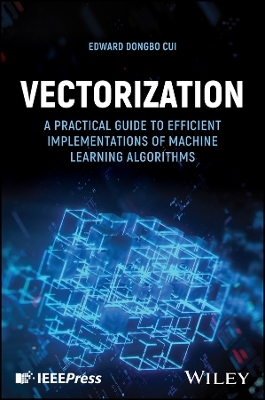
Vectorization
A Practical Guide to Efficient Implementations of Machine Learning Algorithms
Seiten
2024
Wiley-IEEE Press (Verlag)
978-1-394-27294-5 (ISBN)
Wiley-IEEE Press (Verlag)
978-1-394-27294-5 (ISBN)
- Noch nicht erschienen (ca. Februar 2025)
- Versandkostenfrei
- Auch auf Rechnung
- Artikel merken
Enables readers to develop foundational and advanced vectorization skills for scalable data science and machine learning and address real-world problems
Offering insights across various domains such as computer vision and natural language processing, Vectorization covers the fundamental topics of vectorization including array and tensor operations, data wrangling, and batch processing. This book illustrates how the principles discussed lead to successful outcomes in machine learning projects, serving as concrete examples for the theories explained, with each chapter including practical case studies and code implementations using NumPy, TensorFlow, and PyTorch.
Each chapter has one or two types of contents: either an introduction/comparison of the specific operations in the numerical libraries (illustrated as tables) and/or case study examples that apply the concepts introduced to solve a practical problem (as code blocks and figures). Readers can approach the knowledge presented by reading the text description, running the code blocks, or examining the figures.
Written by the developer of the first recommendation system on the Peacock streaming platform, Vectorization explores sample topics including:
Basic tensor operations and the art of tensor indexing, elucidating how to access individual or subsets of tensor elements
Vectorization in tensor multiplications and common linear algebraic routines, which form the backbone of many machine learning algorithms
Masking and padding, concepts which come into play when handling data of non-uniform sizes, and string processing techniques for natural language processing (NLP)
Sparse matrices and their data structures and integral operations, and ragged or jagged tensors and the nuances of processing them
From the essentials of vectorization to the subtleties of advanced data structures, Vectorization is an ideal one-stop resource for both beginners and experienced practitioners, including researchers, data scientists, statisticians, and other professionals in industry, who seek academic success and career advancement.
Offering insights across various domains such as computer vision and natural language processing, Vectorization covers the fundamental topics of vectorization including array and tensor operations, data wrangling, and batch processing. This book illustrates how the principles discussed lead to successful outcomes in machine learning projects, serving as concrete examples for the theories explained, with each chapter including practical case studies and code implementations using NumPy, TensorFlow, and PyTorch.
Each chapter has one or two types of contents: either an introduction/comparison of the specific operations in the numerical libraries (illustrated as tables) and/or case study examples that apply the concepts introduced to solve a practical problem (as code blocks and figures). Readers can approach the knowledge presented by reading the text description, running the code blocks, or examining the figures.
Written by the developer of the first recommendation system on the Peacock streaming platform, Vectorization explores sample topics including:
Basic tensor operations and the art of tensor indexing, elucidating how to access individual or subsets of tensor elements
Vectorization in tensor multiplications and common linear algebraic routines, which form the backbone of many machine learning algorithms
Masking and padding, concepts which come into play when handling data of non-uniform sizes, and string processing techniques for natural language processing (NLP)
Sparse matrices and their data structures and integral operations, and ragged or jagged tensors and the nuances of processing them
From the essentials of vectorization to the subtleties of advanced data structures, Vectorization is an ideal one-stop resource for both beginners and experienced practitioners, including researchers, data scientists, statisticians, and other professionals in industry, who seek academic success and career advancement.
Edward DongBo Cui is a Data Science and Machine Learning Engineering Leader who holds a PhD in Neuroscience from Case Western Reserve University, USA. Edward served as Director of Data Science at NBC Universal, building the first recommendation system on the new Peacock streaming platform. Previously, he was Lead Data Scientist at Nielsen Global Media. He is an expert in ML engineering, research, and MLOps to drive data-centric decision-making and enhance product innovation.
| Erscheint lt. Verlag | 11.2.2025 |
|---|---|
| Sprache | englisch |
| Themenwelt | Informatik ► Theorie / Studium ► Künstliche Intelligenz / Robotik |
| Mathematik / Informatik ► Mathematik ► Algebra | |
| Mathematik / Informatik ► Mathematik ► Analysis | |
| Technik ► Bauwesen | |
| ISBN-10 | 1-394-27294-4 / 1394272944 |
| ISBN-13 | 978-1-394-27294-5 / 9781394272945 |
| Zustand | Neuware |
| Informationen gemäß Produktsicherheitsverordnung (GPSR) | |
| Haben Sie eine Frage zum Produkt? |
Mehr entdecken
aus dem Bereich
aus dem Bereich
Buch | Softcover (2024)
REDLINE (Verlag)
CHF 27,95
Eine kurze Geschichte der Informationsnetzwerke von der Steinzeit bis …
Buch | Hardcover (2024)
Penguin (Verlag)
CHF 39,20
was sie kann & was uns erwartet
Buch | Softcover (2023)
C.H.Beck (Verlag)
CHF 25,20


